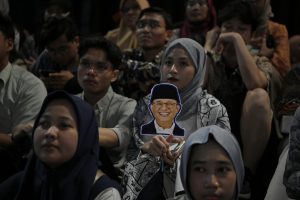Indonesian Defense Minister Prabowo Subianto has maintained his substantial lead over his rivals ahead of the country’s election on February 14, according to an opinion poll released yesterday.
The survey by local pollster Indikator Politik, which polled 1,200 respondents in the December 30 to January 6 period, showed that Prabowo was the preferred choice of 45.8 percent, Reuters reported. Around 25.5 percent supported former Jakarta governor Anies Baswedan, ruling party’s Ganjar Pranowo was the top choice of 23 percent of respondents, while a further 5.8 percent were undecided.
The support for the former general and his running mate, President Joko Widodo’s son Gibran Rakabuming Raka, was virtually unchanged from the previous Indikator Politik survey, conducted between November 23 and December 1, which also found that Prabowo was the preferred option of 45.8 percent of respondents.
As Reuters notes, the result shows that despite holding his 20-plus-point lead, Prabowo is no closer to the more than 50 percent of the vote required to win in a single round. Despite his substantial lead, Prabowo may fall short of the 50 percent necessary to clinch the election in a single round, resulting in a run-off on June 26.
This could open up an opportunity for Anies, a former education minister, who moved into second place for the first time in yesterday’s Indikator surveys, on the back of a series of strong performances in recent election debates.
Anies occupies a curious position in the three-way contest. In a way, both Prabowo and Ganjar are promising continuity with the current administration. In the latter case, Ganjar is running for the ruling Indonesian Democratic Party of Struggle (PDI-P), the party under whose banner Jokowi ran in the 2014 and 2019 elections. Meanwhile, Prabowo’s partnership with Jokowi’s son has been interpreted by many as his de facto endorsement, and may have played a role in Prabowo’s surge in the polls since the announcement of the Gibran’s vice presidential run in late October.
As Erin Cook, the author of the Southeast Asia-focused “Dari Mulut ke Mulut” newsletter, wrote on X (formerly Twitter) earlier this month, despite being a former cabinet minister, Anies is “the only one of the three that can plausibly campaign against current policies.”
The idea of “change” has certainly been a theme of his campaign. In an interview with Reuters earlier this month, after a campaign rally in West Java, Anies said, “What we offer is change, returning civic life back to its track.”
In particular, his campaign has sought to tap into the discontent among many Indonesians over what they see as attempts by President Joko “Jokowi” Widodo to retain influence when he leaves office in October. Much of the concern has focused on the alleged use of political influence to smooth Gibran’s entry into the presidential race – pushing some to draw parallels with Suharto’s authoritarian New Order administration, against which democratic Indonesia has defined itself.
Prior to a controversial Constitutional Court ruling in October, the 36-year-old Gibran was too young to run as Prabowo’s vice president, given that Indonesian election rules impose a minimum age requirement of 40. But the ruling created an exception to the rule for candidates who have served in elected office at the regional level. Gibran has served as mayor of Surakarta, a post once occupied by his father, since 2021.
It was widely suspected that this decision was tailor-made to allow Gibran to run. The petition that led to the ruling was made by the youth-oriented Indonesian Solidarity Party (PSI), to which Jokowi’s other son Kaesang Pangarep was appointed chairman just weeks later. Moreover, the chief justice of the Constitutional Court was none other than Jokowi’s brother-in-law, who was eventually forced to stand down by an ethics panel for failing to recuse himself from the case.
While Jokowi initially showed signs of backing Ganjar, as the PDI-P’s chosen candidate, the appointment of his son has been widely seen as an implicit endorsement of Prabowo, to the extent that Anies and Ganjar felt the need to publicly call on the president to remain neutral during a meeting with him late last year.
Anies repeated similar claims during his interview with Reuters, offering a pretty damning account of the current election campaign In previous elections, Anies told the news agency, “there was no chatter about neutrality, or concerns of foul play. Nothing like what we’re seeing today.” Anies has also been ambivalent about another key Jokowi policy: his eye-wateringly expensive Nusantara capital project on the island of Borneo. “What Indonesia needs now is inclusive growth and equitable development, where development is not concentrated in one location but spread across multiple areas,” he said in a recent speech.
It is hard to gauge how sincere Anies’ promises of change are; this could simply be a case of a candidate playing the cards that he has been dealt. Certainly, Jokowi’s own trajectory illustrates how a candidate can promise and embody change, only to revert to standard practice once in office. But the former minister’s creeping popularity points to a potentially interesting run-off in June, should Prabowo fall short of an outright victory next month.

































